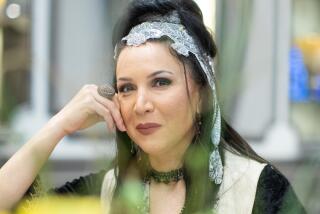Striking ‘Naqoyqatsi’ rounds out trilogy
- Share via
Filmmaker Godfrey Reggio and composer Philip Glass reunite for “Naqoyqatsi,” the conclusion of their film trilogy that began with “Koyaanisqatsi” (1983) and continued with “Powaqqatsi” (1988). The concept is laudable: a provocative fusion of image and music designed to examine the trappings of contemporary civilization and its negative impact on the planet and ourselves. It worked, to a large extent, in the visually stunning “Koyaanisqatsi,” although “Powaqqatsi” turned out to be an insufferable bore.
Happily, “Naqoyqatsi” is closer to the first in impressive imagery, and the music is, for the most part, more successful as a score than both predecessors. Ironically, Reggio uses all the high-tech editing, computer animation and digital colorization at his disposal to sound a warning about the effect of technology. The film breaks down into three general areas: the wired world, our obsession with sports and competition and the pace of 21st century life. Along the way, Reggio tackles medical advances and cloning, the stock market and globalization and the growing tendency to turn to violence for problem-solving.
As in “Koyaanisqatsi,” much of this is involving, although the pace is so relentless that it leaves little time to breathe or grasp precisely what Reggio is attempting to say. The absence of dialogue or narration is, again, an interesting conceit, but an on-screen title now and then might have helped to clarify Reggio’s often murky ideas.
Glass’ patented minimalist style (which can range from hypnotic to maddeningly repetitive) is surprisingly effective. The choice to do this with an orchestra instead of synthesizers -- the latter a more obvious way to score a film about a frightening future -- was smart, and employing cellist Yo-Yo Ma as featured soloist was even smarter. He lends a refreshing human element to the enterprise.
Glass’ use of a wordless mezzo-soprano, the Australian didjeridoo and other offbeat sounds also helps to stave off the aural ennui that marked the music of the previous films.
*
Rated PG for violent and disturbing images and brief nudity. Running time: 1 hour, 29 minutes. Exclusively at the Egyptian Theatre, 6712 Hollywood Blvd., L.A. (323) 466-3456.
More to Read
Only good movies
Get the Indie Focus newsletter, Mark Olsen's weekly guide to the world of cinema.
You may occasionally receive promotional content from the Los Angeles Times.










